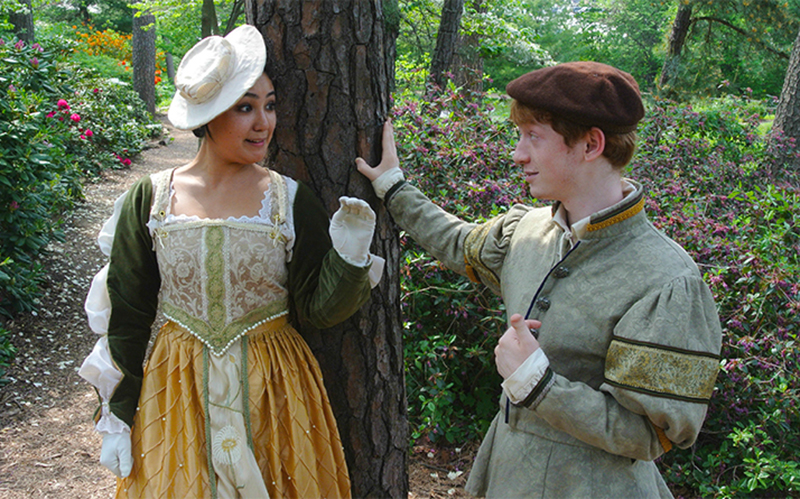Review: Love's Labour's Lost, Shakespeare in the Arb

While watching Shakespeare in the Arb’s Saturday evening production of Love’s Labour’s Lost, which wrapped up its run this past weekend, I realized that it’s kind of the Elizabethan drama ancestor of a famous Seinfeld episode called, “The Contest.”
Why? Because in both stories, four characters make a pledge to each other to suppress sexual desires (and its expression), and in both stories, they fail miserably – and pretty immediately.
Love’s Labour’s Lost, one of Shakespeare’s earliest comedies, begins when Ferdinand, King of Navarre (Will Arnuk), decrees that he and three companions – Lords Berowne (Michael Shapiro), Dumaine (Nicholas Menagan), and Longaville (Jackson Tucker-Meyer) – will dedicate themselves to scholarly study for three years, sleeping little, fasting often, and abstaining from any contact with women, so as to not be distracted.
Shortly after signing the pact, though, Ferdinand’s reminded that the Princess of France (Clare Brennan) is on her way to Navarre, accompanied by three ladies-in-waiting: Rosaline (Amy Robbins), Maria (Rebecca Godwin), and Katherine (Maia Gersten). When the King greets the royal party to explain why they must make camp outside his court, he falls in love with the princess, of course, and his friends become smitten with her companions, leaving the men scrambling to convey their affections to the women while also hiding it from their compatriots.
Shakespeare in the Arb shows are always “traveling” productions, so instead of watching a series of set changes, the audience gets up and moves to a new part of Nichols Arboretum. This is a double-edged sword, of course, because while it gives the players a great variety of natural backdrops within which to play, the logistics of getting a couple hundred audience members from one area of the park to another – separating the ground-sitters up front from the chair-sitters behind – more than a half dozen times can bloat the show’s running time, compromise momentum, and grow unwieldy (audience members at Saturday’s performance seemed to get a smidge grumpier/more impatient with each transplant).
Even so, the unique opportunity to marry classic material with outdoor elements is part of what has made Shakespeare in the Arb a magical, beloved, 16 year old tradition. For watching Ferdinand and his friends hide in the trees as they’re each revealed, one-by-one, to be composing love letters, and seeing the Princess leading her party away, in mourning, far off in the distance as a scene among the men plays out, makes Shakespeare’s text come alive in beautiful, arresting ways.
Not that Love’s Labour’s Lost is among the bard’s best plays – far from it. Like a romantic comedy that doesn’t quite know when to quit throwing obstacles in love’s path, the three hour play drags most heavily in its second half. Once the men confess to each other their love for the women, they decide to abandon the oath and visit the royal party in disguise (according to the text, as Muscovites, but in Kate Mendeloff’s Arb production, they all looked more like The Princess Bride’s Dread Pirate Roberts); but the women get wind of this scheme and play a trick of their own, disguising themselves so that each man professes his love to the wrong woman. And then, when all deceptions have finally been revealed – and it feels like the end is near – the schoolmaster and others present a theatrical pageant, drawing things out further, and the Princess receives news from home that changes everything.
Gersten made the princess a wise, strong and mischievous woman – definitely one of the best, most clearly defined performances of the night – while Robbins’ Rosaline was an ideal, charismatic foil for the equally wily and witty Shapiro. And as the cast’s youngest participant, Elijah Hatcher Kay charmed the socks off the audience as Moth.
Mendeloff incorporates a fun bit of swordplay and dance into the show, and one of her strengths is that her actors always speak Shakespeare’s poetry with a clear sense of meaning and purpose, so that those audience members largely uninitiated in the ways of the bard (including young people) can pretty easily follow the narrative.
So despite the fact that Love’s Labour’s Lost is ultimately the lesser work of a master, Shakespeare in the Arb managed to make its production – which played to many sold out crowds – the occasion for a pretty nice night in the park.
Jenn McKee is a former staff arts reporter for The Ann Arbor News, where she primarily covered theater and film events, and also wrote general features and occasional articles on books and music.


































